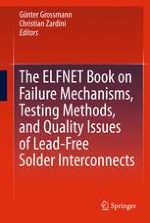2011 | OriginalPaper | Chapter
10. Impact of Humidity and Contamination on Surface Insulation Resistance and Electrochemical Migration
Author : P.-E. Tegehall
Published in: The ELFNET Book on Failure Mechanisms, Testing Methods, and Quality Issues of Lead-Free Solder Interconnects
Publisher: Springer London
Activate our intelligent search to find suitable subject content or patents.
Select sections of text to find matching patents with Artificial Intelligence. powered by
Select sections of text to find additional relevant content using AI-assisted search. powered by
